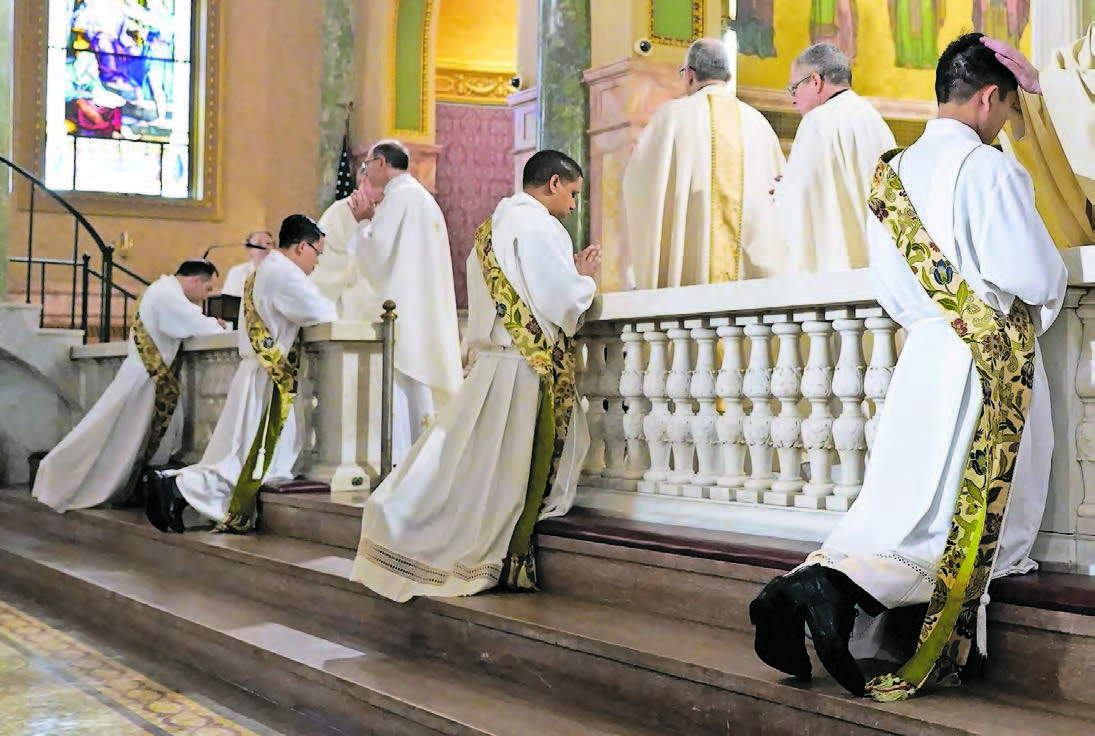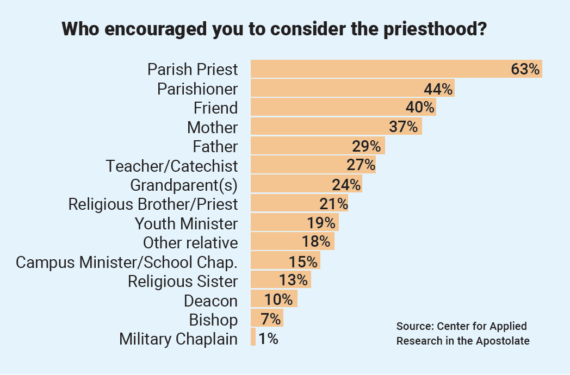
WASHINGTON — Nearly two-thirds of the men being ordained to the priesthood this year said parish priests were an encouraging influence on their vocation, according to a new study.
In the study of this year’s ordination class by the Center for Applied Research in the Apostolate (CARA) at Georgetown University, parish priests topped the list, at 63%, of those who had encouraged the ordinands to consider the priesthood. Other positive influencers included parishioners, 44%, friends, 40%, mothers, 37%, and fathers, 29%.
Others who also had a positive role, in descending order, included teachers or catechists, grandparents, religious brothers, and youth ministers. The survey, of the 458 men scheduled to be ordained this year, was completed by 334 of the ordinands representing 116 U.S. dioceses and eparchies and 24 religious institutes.
The fact that parish priests had such a big impact on priesthood vocations is no surprise to Father Christopher Bethge, vocations director for the Diocese of Brooklyn and faculty member at Cathedral Preparatory Seminary in Elmhurst
If anything, he thinks the number should be higher.
“Unfortunately, it’s not 100%,” he said, noting that without the influence of parish priests, future vocations would be in “even bigger trouble.”
He also said the survey is nationwide and not all parish priests around the country know the young men in their parish, or several parishes they could be serving. Priests are also busy with other things, such as “boilers and bills,” he said, which prevents them from having conversations about potential vocations.
Father Bethge, who was ordained in 2015, told The Tablet that he was in high school when the Diocese of Brooklyn conducted a survey about vocations. It concluded, based on responses, that most high school and college-age Catholics had never been asked if they had considered this calling.
Reflecting on this survey in a column for The Tablet before he retired, Bishop Emeritus Nicholas DiMarzio said: “The results were somewhat surprising because the variable that had the most value was that ‘no one ever asked me.’ Truly, this was a deterrent for vocational recruitment.
“We need to ask, in God’s name as God gives the vocation, and we only prompt the person and help each person to develop that vocation. How important it is that we make sure that young people have the opportunity to respond to God’s call, and do everything we can to facilitate their discernment,” the bishop wrote.
When Father Bethge was asked how these conversations with priests would come about, he said they should primarily be when a priest sees a young man showing interest in the faith, maybe as an altar server or in parish involvement.
Parish priests are essential to vocations, he said, noting that they are “on the front lines” regularly seeing the young men who might consider the calling to the priesthood. He also said every priest needs essentially to be a director of vocations at the parish level, and then the diocesan vocation office can help those who feel they have a calling to the priesthood move from the discernment stage to the seminary.
Parish priests are also essential just by example, as Father Bethge’s own calling can attest.
In a 2017 interview with Currents News, he said: “All the priests that I’ve met really instilled in me what it meant to be a priest: How to love God’s people as a priest and how to love the priesthood.”
Father Bethge said that in the Brooklyn Diocese, he is confident that all the seminarians have been influenced by parish priests, which to him makes sense because it goes along with the biblical passage of Jesus as the Good Shepherd that the sheep follow because they know his voice.
The CARA study was released on Good Shepherd Sunday, which is also the World Day of Prayer for Vocations.
The full report and profiles of the Ordination Class of 2023 are available here: www. usccb.org/committees/clergy-consecrated-life-vocations/ordination-classes

